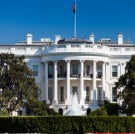The White House appears to be making a point of increasing Kamala Harris’s visibility in foreign policy after President Joe Biden ended his re-election campaign and endorsed his vice president for the Democratic nomination.
Administration officials have increasingly stressed Harris’s participation in calls with world leaders and other foreign policy measures since her entry in the presidential race in July, according to Politico’s review of White House statements and briefings from across the administration.
While it is not unusual for the White House to promote the vice president’s involvement, the frequency of the administration’s mentions, and her joining critical calls alongside the president, suggests an attempt to promote her experience and head off Republican attacks as she moves to the top of the ticket.
Donald Trump and his allies, however, have been promoting Harris’s experience for entirely different reasons — by pivoting from attacks on Biden’s alleged foreign policy failures by trying to argue that it was Harris all along who was responsible for them.
Shortly after Biden and Harris had entered office in 2021, Harris was appointed to travel to and work with Mexico and Latin American countries to address the “root causes” of migration to the US-Mexico border.
Those efforts and subsequent foreign travel received relatively little press attention at the time, but Trump’s campaign has now spun Harris as the “border czar” responsible for the “open border” and unleashing a “migrant crime wave.”
Harris, who served on the Senate Foreign Relations Committee when she was a California senator, touted her foreign policy experience as vice president during her keynote address to the Democratic National Convention.
“We must also be steadfast in advancing our security and values abroad,” she said in her speech. “As vice president, I have confronted threats to our security, negotiated with foreign leaders, strengthened our alliances and engaged with our brave troops overseas.”
She pledged that the US would maintain “the strongest, most lethal fighting force in the world,” if she is elected. Harris also sought to draw a contrast between her potential administration and Trump’s when it comes to dealing with world leaders.
“I will not cozy up to tyrants and dictators like Kim Jong Un who are rooting for Trump,” Harris said. “They know he is easy to manipulate with flattery and favors. They know Trump won’t hold autocrats accountable because he wants to be an autocrat himself.
She also used her speech to remind voters how closely she was involved with the Biden administration’s major foreign policy decisionmaking, including US support for Ukraine and Israel.
“Five days before Russia attacked Ukraine, I met with President Zelenskyy to warn him about Russia’s plan to invade,” she said. “I helped mobilize a global response over 50 countries to defend against Putin’s aggression.”
Following Biden’s call on August 1 with Israeli Prime Minister Benjamin Netanyahu, a White House summary noted that Harris “also joined the call.” Another White House pool report last month noted that Harris joined a call between Biden and Netanyahu during the DNC in Chicago.
On September 2, a White House summary noted that Harris joined Biden in the situation room after six Israeli hostages were found dead in Israel.
Administration officials have also emphasized the role Harris played in securing a landmark prisoner swap that saw the release of Wall Street Journal reporter Evan Gershkovich, Radio Free Europe/Radio Free Liberty reporter Alsu Kurmasheva and Paul Whelan from Russian custody.
Harris also greeted them at the airport upon their return to US soil.
According to The Wall Street Journal, Harris urged both German Chancellor Olaf Scholz and Slovenian Prime Minister Robert Golob separately during February’s Munich Security Conference to get the German government to agree to swap Vadim Krasikov as part of the deal.
Last week, when asked whether China’s Xi Jinping had asked administration officials about her views on China, national security adviser noted that Harris “has been a central member of the Biden foreign policy team, a leading member,” and that she has been involved in the “design and execution” of the administration’s Indo-Pacific strategy.
Source: independent.co.uk



